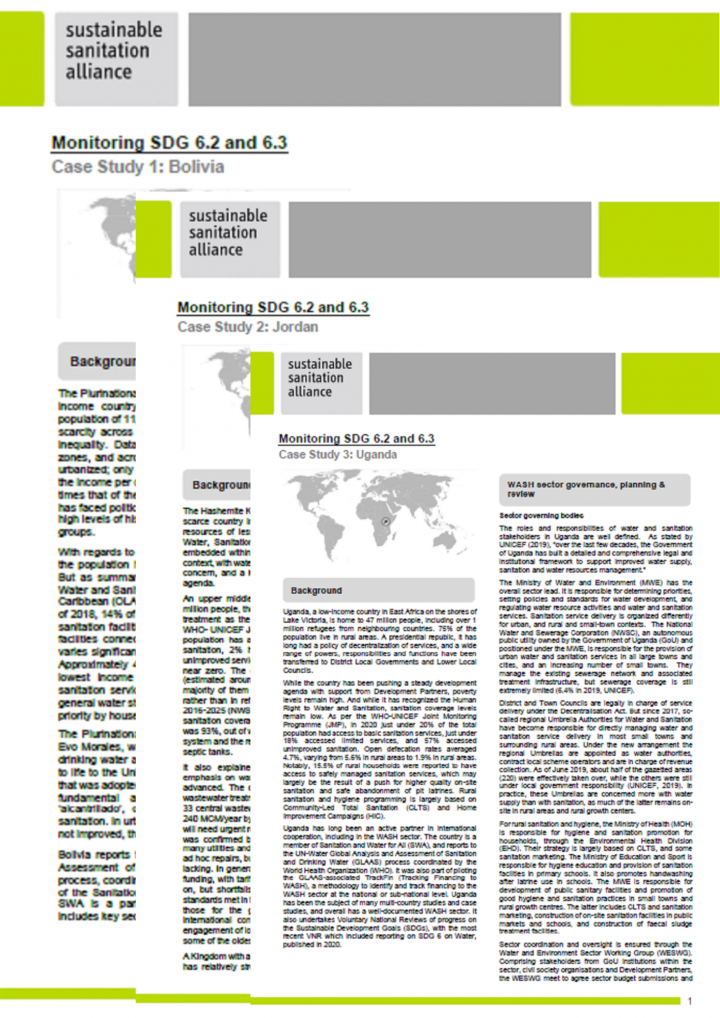Monitoring SDG targets 6.2 and 6.3 in Bolivia, Jordan and Uganda - brief case studies C. van der Voorden (2022)
In line with the expression ‘you manage what you measure’, high quality and regular monitoring is key for the successful achievement of SDG targets 6.2 and 6.3. SuSanA’s Vision Document states the intention to further its work to meet the increasing need for technical assistance in developing methodologies, designing monitoring structures compatible with existing technical and institutional capacities, and in implementing monitoring processes. As a first step to exploring deeper SuSanA engagement on SDG 6.2 and 6.3 monitoring, in September of last year the Secretariat commissioned Carolien van der Voorden to undertake a rapid desk-review on the state of sanitation monitoring in three diverse countries, Bolivia, Jordan and Uganda; and to understand the institutions, actors, processes and mechanisms involved.
The Plurinational State of Bolivia, a landlocked lower middle-income country in the heart of South America with a population of 11,5 million people (2019), faces frequent water scarcity across some of its geographical zones, and large inequality. Data shows divides between rural and urban zones, and across wealth quintiles. The country is strongly urbanized; only 36% of Bolivians live in rural areas. Overall, the income per capita of the highest quintile in Bolivia is 13.5 times that of the lowest quintile. In recent years the country has faced political and social instability, in part related to the high levels of historical disparity between different population groups.
The Hashemite Kingdom of Jordan is the second most water scarce country in the world, with annual renewable water resources of less than 100 m3 per person. As such, the Water, Sanitation and Hygiene (WASH) sector is deeply embedded within the broader water resource management context, with water a key environmental, economic, and social concern, and a key sector for the country’s Green Growth agenda.
Uganda, a low-income country in East Africa on the shores of Lake Victoria, is home to 47 million people, including over 1 million refugees from neighbouring countries. 75% of the population live in rural areas. A presidential republic, it has long had a policy of decentralization of services, and a wide range of powers, responsibilities and functions have been transferred to District Local Governments and Lower Local Councils.
Bibliographic information
C. van der Voorden (2022). Monitoring SDG targets 6.2 and 6.3 in Bolivia, Jordan and Uganda - brief case studies SuSanA
Filter / Tags
Publications by SuSanACase studies in other formatsPresentationsEnglish
External links
Link to the SuSanA forum discussion
Downloads
Monitoring SDG targets 6.2 and 6.3 in Bolivia
Type: application/pdf
Size: 0.23 MB
Monitoring SDG targets 6.2 and 6.3 in Jordan
Type: application/pdf
Size: 0.21 MB
Monitoring SDG targets 6.2 and 6.3 in Uganda
Type: application/pdf
Size: 0.2 MB
Monitoring SDG targets 6.2 and 6.3 in Bolivia, Jordan and Uganda - Presentation
Type: application/vnd.openxmlformats-officedocument.presentationml.presentation
Size: 0.58 MB
Monitoring SDG targets 6.2 and 6.3 in Bolivia, Jordan and Uganda - Recorded presentation
Type: application/vnd.openxmlformats-officedocument.presentationml.presentation
Size: 24.65 MB

